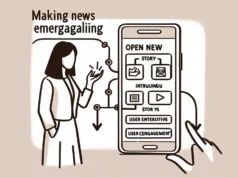In an era where technology relentlessly reshapes our perception of the world, Virtual Reality (VR) stands as a groundbreaking force in the realm of digital journalism. This burgeoning technology is not just a fad but a transformative tool that is redefining the boundaries of how news is narrated and experienced.
The Advent of VR in Digital Journalism: A Game-Changer
The incorporation of VR into journalism marked a pivotal shift from traditional storytelling methods. Initially perceived as an experimental niche, it rapidly demonstrated its potency in delivering news with an immersive depth. Globally recognized media houses have begun investing heavily in VR capabilities, seeking to leverage this technology to offer more compelling, empathetic narratives.
VR and Immersive Storytelling: A New Horizon
What distinguishes VR in the landscape of journalism is its unparalleled ability to craft a sense of presence and immersion. Traditional news often positions viewers as external observers. VR, however, immerses them in the environment, offering a first-hand perspective of events. This not only enhances the depth of understanding but also fosters a more profound emotional connection with the subject matter.
Transformative Use Cases of VR in Journalism
- Conflict Zones: VR has made significant strides in conflict reporting. By virtually placing viewers in war zones, it offers an unadulterated view of the impact of war, far beyond what conventional reporting can achieve.
- Environmental Journalism: VR experiences have been pivotal in transporting users to rapidly changing ecosystems, like melting glaciers or bleached coral reefs, thereby amplifying the urgency of environmental issues.
- Cultural Narratives: Another impactful use of VR is in presenting rich cultural and social stories, providing a platform to voices that are often sidelined in mainstream media.
The Ethical Landscape of VR Journalism
With its rise, VR journalism also brings forth a plethora of ethical considerations. The authenticity of the narrative, potential biases in the portrayal of stories, and the effects of immersive content on the audience’s perception are critical aspects that need constant scrutiny. Preserving journalistic integrity and accuracy in VR storytelling is as crucial as in traditional forms.
Technological Evolution and Its Future Implications
As VR technology advances, becoming more accessible and user-friendly, its application in journalism is expected to expand. The future might see interactive and personalized news experiences, where users can engage with stories in a more dynamic manner. The educational potential of VR in journalism is vast, opening avenues for immersive learning experiences.
VR in Journalism: More Than Just a Technological Leap
Virtual Reality in journalism represents a significant leap, not just technologically but in the very essence of storytelling. It’s a medium that promises to bring narratives to life in unprecedented ways, forging a more informed, empathetic, and engaged global audience. As we witness the continuous evolution of news consumption, VR emerges not merely as a tool but as a transformative medium, redefining the art of storytelling in the digital age.






